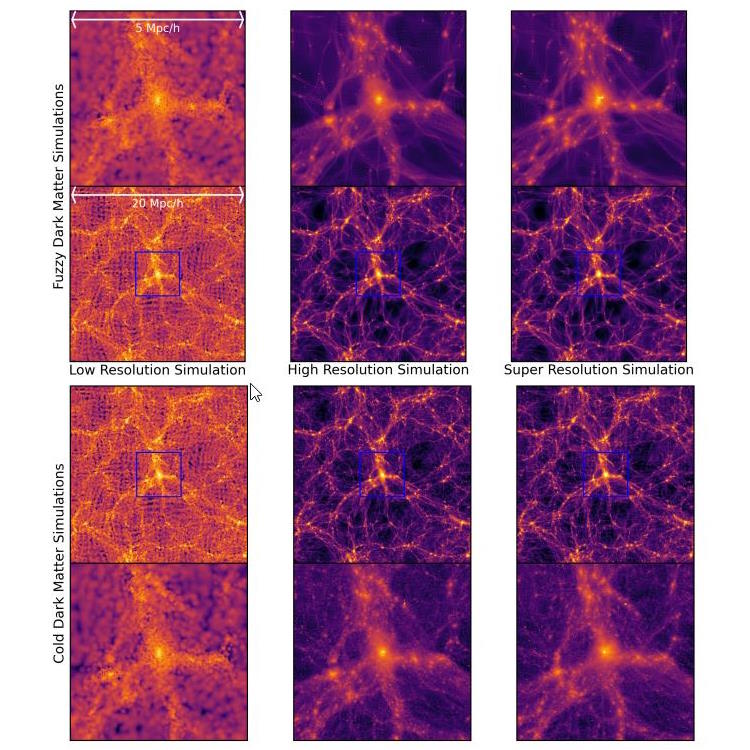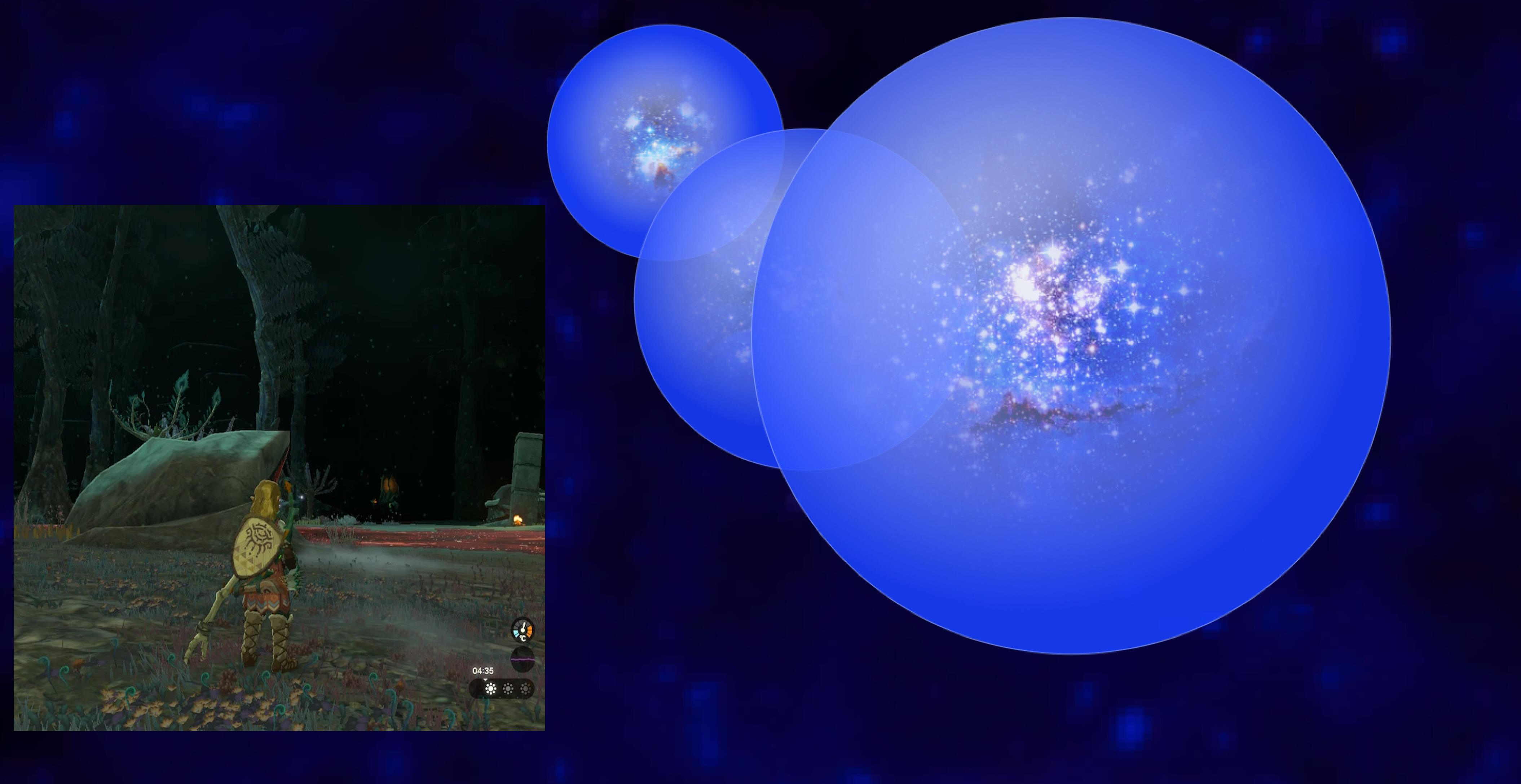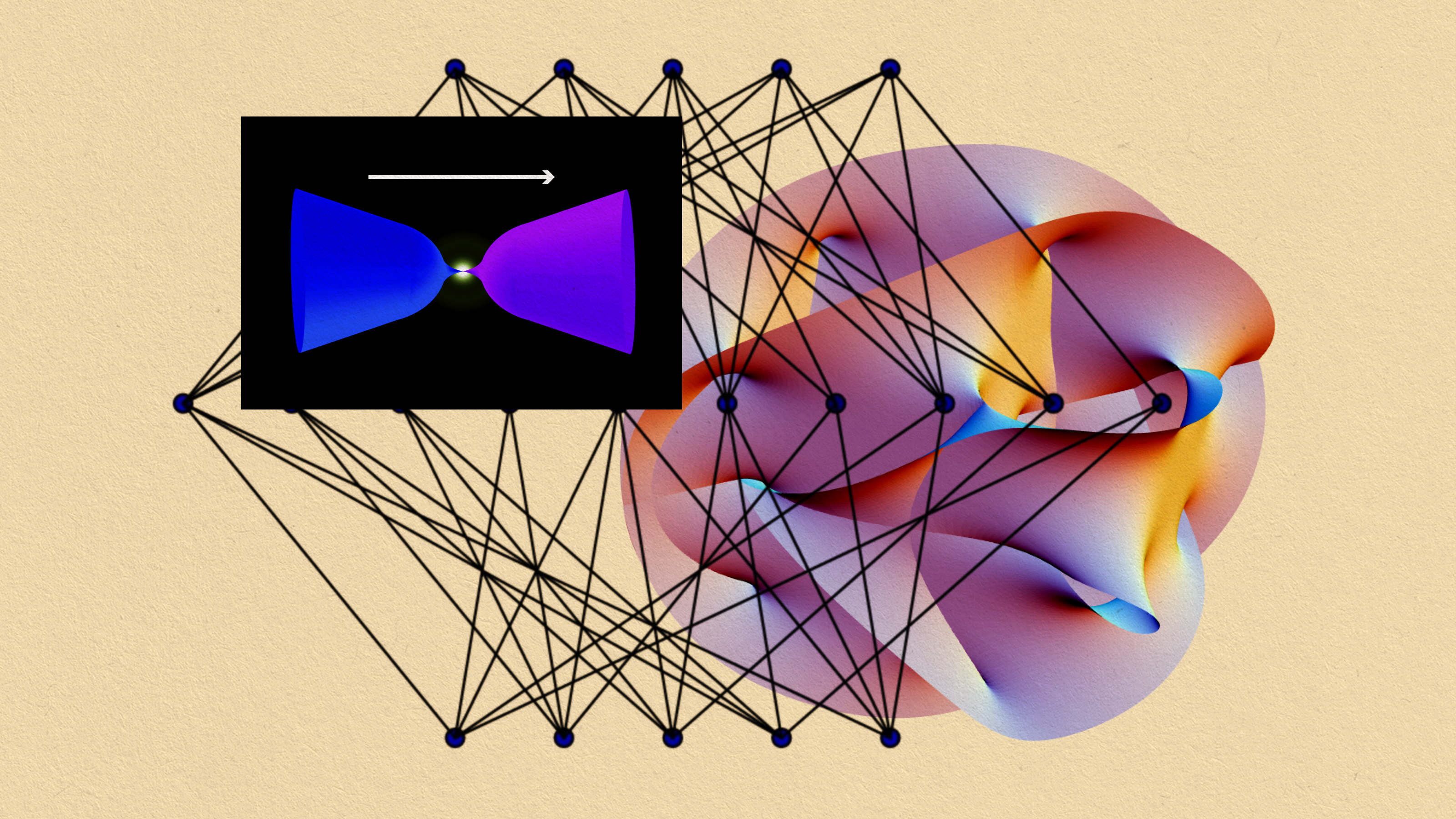KATIE MACK: Understanding what dark energy is, understanding what it is that's making the universe expand faster is an incredibly important thing for understanding the future of the universe. Right now, the evolution of the cosmos is dominated by this mysterious dark energy that we can't see, we don't understand. If we figure out what it's doing, if we figure out what it's made of, how it's going to change in the future, then we will have a much better idea for how the universe will end.
Dark matter is very different from dark energy. People often get these two ideas confused because they're both called dark. And also because there are connections between matter and energy. People might have heard of E = mc2, this idea that there's a way to relate the mass of something to its energy, that's from Einstein. In this case, dark matter and dark energy don't seem to be related to each other in any way, that we know. They're both called dark because we cannot see them and they're mysterious. That's where the similarity ends. Neither one is dark in the sense of being black. They're dark in the sense of being invisible. They don't emit light, they don't absorb light, they don't reflect light. They don't seem to interact with light at all, as far as we can tell.
Dark matter seems to be something that interacts via gravity so it has mass, it's matter. But it doesn't seem to interact via the other forces of nature in any way that we've been able to tell. Dark energy only does this thing where it makes space expand, it interacts only with space. And there's a possibility that dark energy is just a property of space that every little bit of space has a little bit of expansion built in, and as the universe gets bigger and bigger, there's more and more space, and so that expansion starts to win out over the gravity that's trying to slow it down. And so, the universe starts expanding faster and faster. That's one possibility for dark energy, that it's just a cosmological constant, it's just part of how the universe works, that it has this expansiveness built into it.
But it's possible it's something else. It's possible that whatever is making the universe expand faster and faster is something weird and different, something that acts in a totally different way. That also accelerates the expansion of the universe, but maybe it changes over time in some way that we don't understand. One of the possibilities for that is something called phantom dark energy. Phantom dark energy would be something where dark energy is getting more powerful over time. That means that in a particular volume of space, the amount of dark energy in that volume starts growing. And that would actually lead to a total apocalypse in a relatively short time. What it would do is it would start tearing apart things in the universe. If dark energy is not a cosmological constant, if it's this phantom dark energy, then the amount of dark energy is going to get higher over time. And so, the stars that have been orbiting very stably in the past will start to feel pushed out by more and more of this expansion happening inside the galaxy.
So, in the scenario that dark energy is this weird stuff, this phantom dark energy, then it does start to actually pull matter apart. So it would first start to pull galaxies away from other galaxies in these giant galaxy clusters. Then it would start to pull stars away from galaxies, so we'd see the stars in the Milky Way would start to drift away. And then it would start to pull planets away from their suns. And then, it would start to actually pull apart planets and stars, and even eventually atoms and particles—it would start to just rip everything apart. And in some, at some point in the future, it would kinda tear apart the whole universe in a process we know as The Big Rip.
So, based on our current data, there's some uncertainty in our current measurements of the expansion of the universe. And that uncertainly leaves some space for the possibility that our universe is headed toward a Big Rip. And based on the uncertainties in the measurements, what we can say is that we're almost certain not to have a Big Rip in the next 200 billion years or so. But we can't say for sure that it will never happen. And even as we get more and more precise measurements, all that's really going to do is push this scenario farther into the future, and say, well, maybe we'll get much better measurements in a few years, and then that'll tell us we definitely won't have a Big Rip for the next hundred thousand billion years. You might, at some point, get to that, but you'll never be able to say that it'll never happen because no measurement is ever 100% complete. So unless we really understand what dark energy is, which at the moment, we don't, we can't say for certain that it won't at some point, rip the universe apart. We can just say that if it's going to do that, it'll be a really long time from now.
Alternatively, dark energy could be something that changes fundamentally over time, that doesn't get more powerful, but gets less powerful and actually changes direction. So, dark energy could be something that's currently making the universe expand faster, but it could be something that changes and at at some point, starts to pull the universe back together again. Right now, we know that the universe is expanding, galaxies are getting farther apart from each other. And for a long time, we were trying to measure how quickly that expansion was slowing down. And we figured it should be slowing down because the Big Bang happened in the beginning, that kicked off the expansion, and since then, all the gravity of all the stuff in the universe should be kinda putting on the brakes, kinda pulling things back.
For a long time, we didn't know if the gravity would eventually win, or if the expansion was so powerful that everything will be moving away from everything else forever. And if the gravity were to win, then what would happen is the expansion, at some point, would stop. And distant galaxies, instead of moving away from us, would start barreling toward us in the future. And the way that it would look to us is that we would see distant galaxies kinda coming toward us. We would see collisions of galaxies much more often. Other galaxies would collide with our galaxy. There would be a lot more stuff in the smaller region of space, just everywhere in the universe. The universe would get much more dense.
And the thing that would actually get dangerous about that, the first thing that would get dangerous about that is that as the universe is compressing, it's not just compressing like the galaxies, the stars, and stuff like that, it's compressing all of the radiation in the universe as well. And we know that there's background radiation in our universe today that's leftover from the time when the early universe was very hot and dense. It dissipated. It sort of spread out, but that radiation is still out there. And so, if you're compressing the universe, you're bringing all that radiation back into a smaller space. And so, you're moving toward being back in that plasma state, you're evolving toward being, the whole universe being hot and dense, and in sort of this roiling plasma. As the universe is compressing, not only is it bringing back all that radiation from the primordial fire, it's also compressing all the radiation from all of the stars that ever burned in the universe.
More and more, any random point in the universe would feel a lot more like being right next to a star. And all of these high energy processes in the universe that create gamma rays and x-rays, that radiation also would be compressed. And so, at some point, as you're evolving toward a Big Crunch scenario, as the universe is compressing, you get to a point when there's so much radiation in the universe, just an empty space, just so much radiation that it's enough to ignite the surfaces of stars. And what I mean by that is that there's so much of this high energy radiation just flowing through the universe, that the outsides of stars start carrying out thermonuclear explosions. So stars will start to just burn from the outside in. And at that point, you know, it's all over. Nothing can survive conditions like that. And you end up with just total destruction. That's The Big Crunch. The only way we can see that happening is if dark energy is so weird that it doesn't just cause expansion, it actually stops, turns around, and causes compression. And because we don't know what dark energy is, we don't know if it's something that can change over time. We don't know if it's on some trajectory. We can't rule out the idea that it could, at some point, reverse directions. We think that's probably not going to happen.





